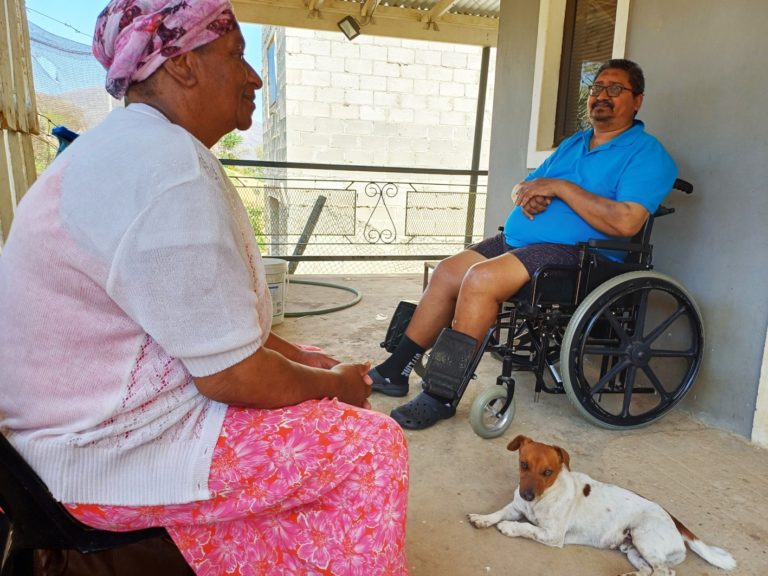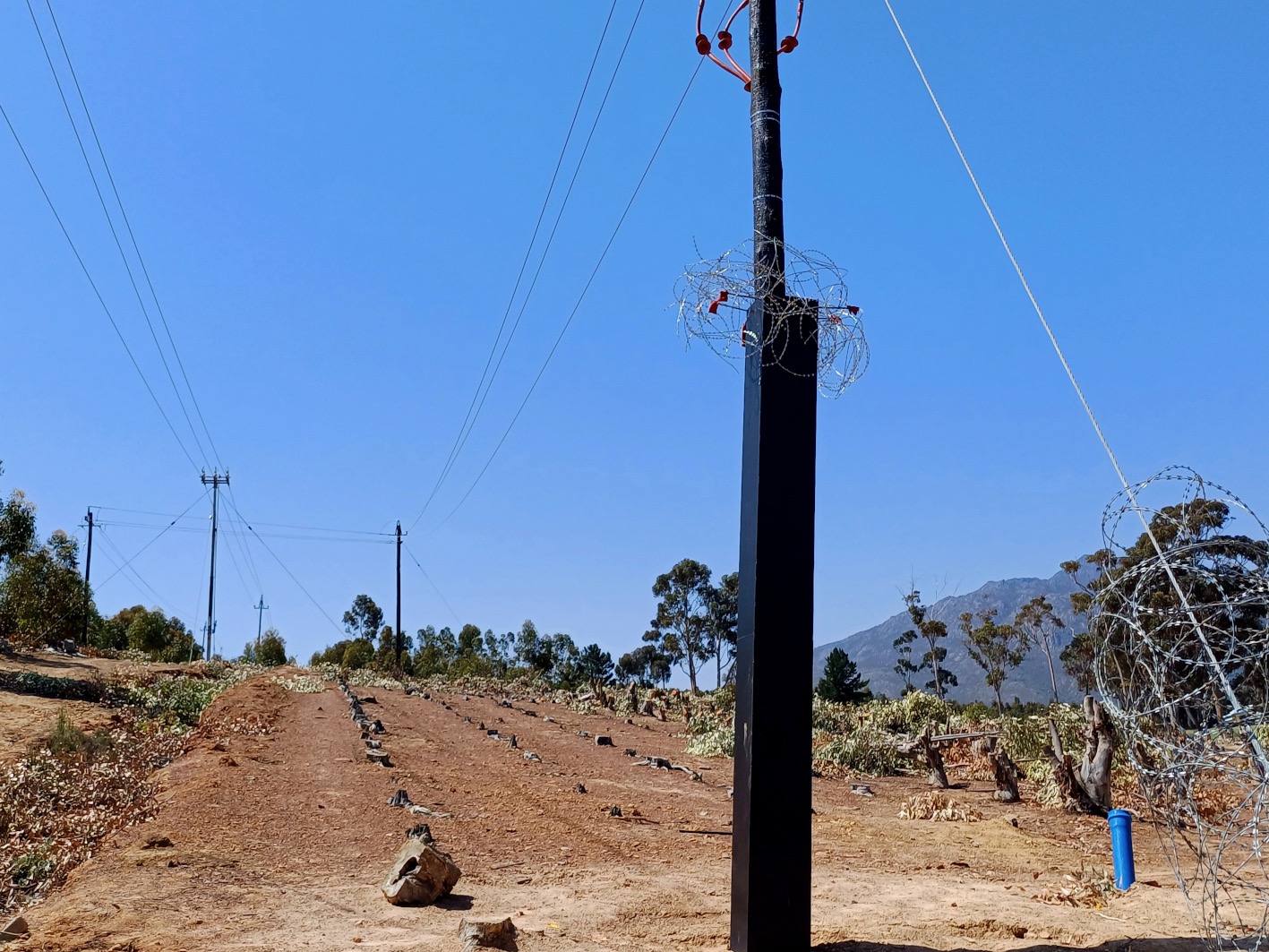Electricity poles that have been cut down by criminals have been replaced, with the addition of a metal cladding in an effort to prevent the poles being targeted again. Photos: Steve Kretzmann
Repeated extended blackouts as electricity poles are cut down and cables stolen
By Steve Kretzmann
Repeated cable theft, involving poles being cut down, has plagued the Western Cape town of Villiersdorp since August, with residents this week petitioning the mayor to get help from provincial or even national authorities.
After numerous power cuts caused by storms in July, the town was again left in the dark when electricity poles were cut down and cables stolen on 3 August.
There have been at least nine other incidents of cable theft since then, leaving the entire town and surrounding farms without power for extended periods. The longest blackout was for about 48 hours in mid-September, according to a record kept by resident Sacha Wilson. The most recent incident was on 2 October.
The repeated blackouts have caused losses for residents, businesses and farmers, and disrupted health and social services.
Wilson, together with neighbour Leonhard Praeg, presented a petition with 430 signatures to Mayor Tienie Zimmerman on Tuesday, calling for the municipality to seek assistance from provincial authorities to tackle what they believed is “a syndicate of organised crime … holding the town to ransom”.
Zimmerman, according to Praeg, agreed that the scale and sustained nature of the cable theft indicated a criminal syndicate was at work.
Despite numerous attempts, GroundUp has been unable to obtain any official response from the Theewaterskloof Municipality. But according to Praeg, Zimmerman said the matter had already been escalated to provincial and even national level, and said the masterminds needed to be caught or they might just move on to hit another town.
Praeg said Zimmerman told them the scale and sophistication of the cable theft operations indicated a syndicate was at work. Working at night within earshot of residential areas, the criminals would have had to have a vehicle and relatively quiet battery-powered saws.
Zimmerman told Praeg and Wilson an arrest had been made. But provincial police media liaison officer FC van Wyk did not respond when we asked about the arrest. Van Wyk only confirmed there were “incidents of vandalism of Eskom poles and copper cable being stolen”, and that “integrated operations are in process to curb these crimes”.
Impact on health and social services
Operational manager at the Villiersdorp state clinic Sister Hester Blignaut said the clinic has no backup power and they cannot properly examine patients during blackouts. While existing patients’ files could be retrieved, new patients could not be logged on the system, and about 30 pregnant women couldn’t get their ultrasounds on the one day of the month when the sonographer came to the clinic.
Blignaut said the dentist could also not work without power, and they could not access bookings on the system. A lack of power was particularly problematic if an emergency patient was admitted, as none of the clinic’s equipment would work.
“We do what we can”, she said. She said nurses used their own mobile data to download pathology lab results for patients when the power was down.

At the Youth Cafe, a resource centre run by Violence Prevention through Urban Upgrading, a non-profit development programme, administrator Monique Cananie said 16 students participating in the Youth Cafe’s computer training course were not able to graduate due to interruptions to their four-week course. Assistance and resources provided for job applications, CV submissions, registration at educational institutions, and other services, could not be offered when the power was down, and pupils were not able to access the internet to do research for school or other educational assignments.
She also said UIF payments, offered once a month at the resource centre by a mobile unit, could not operate on their assigned day in September due to the lack of power. This left beneficiaries having to go without their payment until the mobile unit returned in October.
Additionally, Cananie said the SASSA mobile unit which arrived monthly for child support grant applications and queries, could not operate when they arrived on their scheduled day last month.

Cable theft on 2 October also affected grant beneficiaries. Joyce Malgas, who draws a state old-age grant, said she could not access her grant because the bank teller machines weren’t working. Malgas said it took two days to access her grant money as when she returned the next day, there was no money left in the teller machine due to the rush when power was restored.
She said people slept outside the bank to draw their grant money as soon as the power was back.
Very few businesses in the town had backup power, and lost trade during the power cuts. Owner of the Kekkel and Kraai frozen chicken outlet, Stoffel Germishuys, said he had lost about R20,000 in business over the past few months. Germishuys said he avoided losing stock by having 400 litres of ice in storage to keep the meat frozen, but the card machine didn’t work, and people were not able to draw money, resulting in a drastic loss of sales.
The unplanned power outages also hit the pockets of poor residents. Resident Joey Cananie, who uses a wheelchair since he had a stroke, said his household of five had lost two braaipacks and a pack of lamb chops in their freezer. He said with his eldest son being the only employed person in the household, they couldn’t simply buy more meat. Cananie also said that inexplicably, people lost between four or five electricity units every time the power went off.
“Maybe it’s at 50 units when the power goes out, but when it comes back on it’s less by about four units. Yet you’ve used no electricity.”
Johanne Daries, who is unemployed, said her pre-paid electricity meter burnt out, and her fridge and microwave had stopped working due to the power outages. Daries said without a fridge, she had to ask a neighbour to store her groceries, but had to pay them R30 to R50 to compensate them for electricity.
Meanwhile, on the farm High Noon, 12 families have had no electricity since 12 September after two electricity poles were cut down and cable stolen during the night.
Farm manager Machiell Rall said Eskom managed to fix the one pole within two days, but the other pole was inaccessible due to saturated ground from recent heavy rainfall. Rall said the second pole had since been fixed about two weeks ago, but then it was discovered that wiring on the metering box had been stolen.
He said Eskom had ordered the necessary parts, which would have been installed by now, but the technicians kept getting called to deal with the emergency repairs in Villiersdorp. In the meantime, the farm had supplied the affected households with gas for cooking and heating. He said that fortunately, the line supplying the farming operations had not been affected.
Follow African Insider on Facebook, Twitter and Instagram
Source: GroundUp
Picture: GroundUp
For more African news, visit Africaninsider.com


